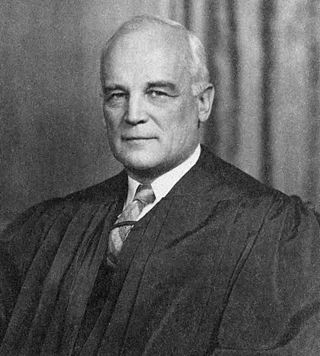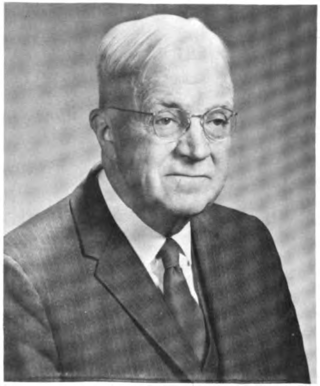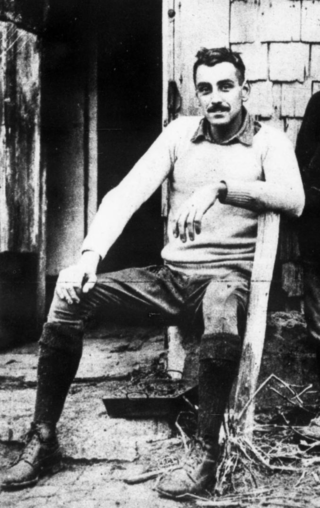Brown v. Board of Education of Topeka, 347 U.S. 483 (1954), was a landmark decision by the U.S. Supreme Court, which ruled that U.S. state laws establishing racial segregation in public schools are unconstitutional, even if the segregated schools are otherwise equal in quality. The decision partially overruled the Court's 1896 decision Plessy v. Ferguson, which had held that racial segregation laws did not violate the U.S. Constitution as long as the facilities for each race were equal in quality, a doctrine that had come to be known as "separate but equal". The Court's decision in Brown paved the way for integration and was a major victory of the civil rights movement, and a model for many future impact litigation cases.

Harold Hitz Burton was an American politician and lawyer. He served as the 45th mayor of Cleveland, Ohio, as a U.S. Senator from Ohio, and as an associate justice of the Supreme Court of the United States.
Charles Hamilton Houston was a prominent African-American lawyer, Dean of Howard University Law School, and NAACP first special counsel, or Litigation Director. A graduate of Amherst College and Harvard Law School, Houston played a significant role in dismantling Jim Crow laws, especially attacking segregation in schools and racial housing covenants. He earned the title "The Man Who Killed Jim Crow".

Mary Frances Berry is an American historian, writer, lawyer, activist and professor who focuses on U.S. constitutional and legal, African-American history. Berry is the Geraldine R. Segal Professor of American Social Thought where she teaches American legal history at the Department of History, School of Arts & Sciences at the University of Pennsylvania. She is the former chairwoman of the United States Commission on Civil Rights. Previously, Berry was provost of the College of Behavioral and Social Science at University of Maryland, College Park, and was the first African American chancellor of the University of Colorado at Boulder.
Eyes on the Prize: America's Civil Rights Movement is an American television series and 14-part documentary about the 20th-century civil rights movement in the United States. The documentary originally aired on the PBS network, and it also aired in the United Kingdom on BBC2. Created and executive produced by Henry Hampton at his film production company Blackside, and narrated by Julian Bond, the series uses archival footage, stills, and interviews by participants and opponents of the movement. The title of the series is derived from the title of the folk song "Keep Your Eyes on the Prize", which is used as the opening theme music in each episode.
Lawrence Arthur Cremin was an educational historian and administrator.
The civil rights movement (1896–1954) was a long, primarily nonviolent action to bring full civil rights and equality under the law to all Americans. The era has had a lasting impact on American society – in its tactics, the increased social and legal acceptance of civil rights, and in its exposure of the prevalence and cost of racism.

An American Dilemma: The Negro Problem and Modern Democracy is a 1944 study of race relations authored by Swedish economist Gunnar Myrdal and funded by Carnegie Corporation of New York. The foundation chose Myrdal because it thought that as a non-American, he could offer a more unbiased opinion. Myrdal's volume, at nearly 1,500 pages, painstakingly detailed what he saw as obstacles to full participation in American society that American blacks faced as of the 1940s. American political scientist, diplomat, and author, Ralph Bunche—who was the first African American to receive a Nobel Prize—served as Gunnar Myrdal's main researcher and writer at the start of the project in the fall of 1938.
Richard Kluger is an American author who has won a Pulitzer Prize. He focuses his writing chiefly on society, politics and history. He has been a journalist and book publisher.

Jointly presented by the Southern Regional Council and the University of Georgia Libraries, the Lillian Smith Book Awards' honor those authors who, through their outstanding writing about the American South, carry on Lillian Smith's legacy of elucidating the condition of racial and social inequity and proposing a vision of justice and human understanding.

Barbara Rose Johns Powell was a leader in the American civil rights movement. On April 23, 1951, at the age of 16, Powell led a student strike for equal education at R.R. Moton High School in Farmville, Prince Edward County, Virginia. After securing NAACP legal support, the Moton students filed Davis v. Prince Edward County, the only student-initiated case consolidated into Brown v. Board of Education, the landmark 1954 U.S. Supreme Court decision declaring "separate but equal" public schools unconstitutional.
Louis Lorenzo Redding was a prominent lawyer and civil rights advocate from Wilmington, Delaware. Redding, the first African American to be admitted to the Delaware bar, was part of the NAACP legal team that challenged school segregation in the Brown v. Board of Education case in front of the U.S. Supreme Court. He was 96 when he died at a hospital in Lima, Pa.
Ashes to Ashes: America's Hundred-Year Cigarette War, the Public Health, and the Unabashed Triumph of Philip Morris, written by Richard Kluger and published by Alfred A. Knopf in 1996, won the 1997 Pulitzer Prize for General Non-Fiction.
Kenneth W. McFarland born in Caney, Kansas was an educator, public speaker, writer and conservative commentator. An early conservative, Kenneth McFarland was the public school superintendent for Coffeyville, Kansas where he founded the McFarland Trade School. Later he was hired as superintendent of the Topeka, Kansas school system, the school system in the landmark case Brown v. Board of Education 347 U.S. 483 (1954) McFarland was reportedly a staunch supporter of the political and racial status quo of the time.

Albert Vickers Bryan was a United States circuit judge of the United States Court of Appeals for the Fourth Circuit and previously was a United States district judge of the United States District Court for the Eastern District of Virginia and the father of another federal judge, Albert Vickers Bryan Jr.
Julius Waties Waring was a United States district judge of the United States District Court for the Eastern District of South Carolina who played an important role in the early legal battles of the American Civil Rights Movement. His dissent in Briggs v. Elliott was foundational to Brown v. Board of Education.

The American Fund for Public Service, commonly known as the Garland Fund, was a philanthropic organization established in 1922 by Charles Garland. The fund, administered by a group of trustees headed by Roger Baldwin of the American Civil Liberties Union, ultimately disbursed some $2 Million to a variety of radical and left wing institutions, including the Federated Press labor news service, the Vanguard Press publishing house, The New Masses magazine, The World Tomorrow magazine, and to the legal defense fund associated with the 1926 Passaic Textile Strike, as well as a host of similar projects. The fund was terminated in 1941.

Lucinda Todd was an African-American teacher and education activist.
Vivian "Buster" Burey Marshall was an American civil rights activist and was married for 25 years, until her death, to Thurgood Marshall, lead counsel for the NAACP Legal Defense Fund, who also managed Brown v. Board of Education (1954). Following her death, her husband was later appointed as the first African-American U.S. Supreme Court Justice.








